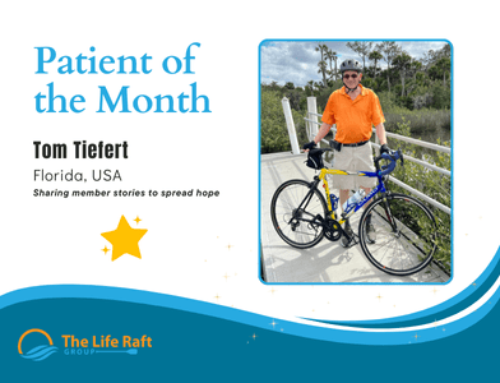Updated June 4, 2023
Patient guidelines for GIST were released and can be accessed here.
New Changes in the 2023 NCCN Clinical Practice Guidelines
The National Comprehensive Cancer Network (NCCN) recently updated the clinical practice guidelines in oncology for medical professionals for several types of cancer including Gastrointestinal Stromal Tumors (version 1.2023). The NCCN guidelines define the recommendations for management, care, and treatment of all cancers in the US. These guidelines are a set of evidence-based recommendations for the diagnosis, treatment, and management of various types of cancer. The Life Raft Group believes these changes are very impactful for patients and that patients and their oncologists should be aware of the new guidelines. Many changes impact treatment lines, especially for patients with metastatic disease or recurrence.
One of the most important changes that we wish to highlight on the updated guidelines is the emphasis on performing mutational testing for all patients (resectable & unresectable) when medical therapy is considered. Furthermore, the guidelines now recommend the use of SDHB immunohistochemistry staining as well as other biomarkers like CD117, DOG1, and CD34 to support the diagnosis of GIST.
After mutational testing has been performed, imatinib (Gleevec) remains the first-line treatment for GIST except in cases of PDGFRA exon 18 D842V-mutated GIST. Previously Sutent (sunitinib) was indicated as second-line therapy for metastatic or progressive disease. New recommendations were added after progression on all approved therapies including dose escalation of Qinlock (ripretinib) and (Iclusig) ponatinib.
For PDGFRA exon 18 and D842V mutations (imatinib-insensitive), a second-line treatment of dasatinib (Sprycel) has been added as a recommendation. Ripretinib is also an option when patients have already failed both avapritinib and dasatinib.
The updated guidelines now include neoadjuvant and first line therapies useful in certain circumstances for BRAF, SDH, and NTRK. Furthermore, there have been revisions to the surgery guidelines and the addition of a new section called Interventional Oncology which covers catheter-directed therapies such as radioembolization and chemoembolization.
One thing that remains the same is the recommendation that all patients should be evaluated and treated by a GIST specialist. The LRG agrees strongly with this recommendation as we continue to encourage all patients to seek attention from a specialist near their area. If you do not have a GIST specialist, please contact us, or visit our GIST specialist’s database https://liferaftgroup.org/gist-specialist-list-us/
In light of such significant changes to the NCCN guidelines, The Life Raft Group strongly recommends that all GIST patients & oncologists review these changes for guidance on the most effective treatment options. The patient version of these guidelines will be published in May 2023.
Note: if you have not received mutational testing and reside in the US, please contact our Data Management & Research team to discuss access to free mutational testing: patientregistrydepartment@liferaftgroup.org
Resources:
NCCN Recommendations on Adjuvant and Neoadjuvant Treatments for GIST (Targeted Oncology post 3.28.23)
Edwin Choy, MD, director of the Sarcoma Program at the Division of Hematology Oncology at Massachusetts General Hospital, a founding member of Mass General Brigham, associate professor of medicine at Harvard Medical School, explains the National Comprehensive Cancer Network (NCCN) Clinical Practice Guidelines for the treatment of gastrointestinal stromal tumors (GIST).
Navigating GIST NCCN Guidelines Webinar
Navigating Survivorship Care
(this webinar gives an explanation of NCCN Guidelines at timestamp 30:17)




